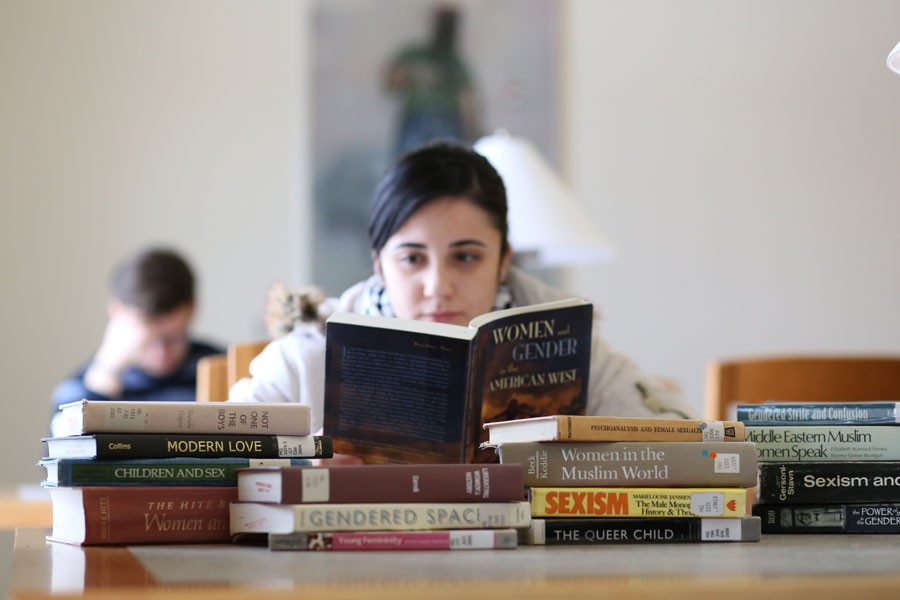Far from familiar: Sexual stereotypes
Palestinian student talks sexual restrictions, freedoms
Deena Bregheith, a junior international student, looks through books about gender and sexuality Tuesday in Rice Library. Bregheith wants to learn more about these subjects while in the U.S. because her home country, Palestine, does not offer such education.
The Shield interviewed three international students to see how they were acclimating to life at a U.S. university. In this weekly series, The Shield revisited Deena Bregheith, a junior English major from Palestine, to see how sexuality is perceived in Palestine versus the U.S.
The Shield: Can you tell The Shield a little bit about how sexuality and sexual depictions are viewed in Palestine?
Bregheith: Well, it’s not only in my country, in all Arab countries sexuality is not discussed that much. There is no education in that area.
I remember one incident when I was in 10th grade and we had this lesson in our science book about the ovaries and the sexual parts and orgasms that men have and women have and how they are different. So on that day, they combined us together in one class and one of the teachers explained that lesson to us because the other ones didn’t feel comfortable talking about these things.
The class was really awkward and full of chuckles and laughter. It wasn’t that big of a deal. These are our bodies. We didn’t even speak about sex or anything, it was just some drawings in the science book. It was so awkward and it was the only thing we had at our school. We are not open in that area.
The Shield: Did you have a stereotypical idea of what it would be like in U.S.?
Bregheith: I think in America, people are more educated when it comes to their sexual lives and sexuality in general. One big difference is you talk about things more often here. You have gay rights and gay marriages and that would take hundreds of years to happen in Arab countries because it’s so different, and different things make people feel scared and threatened by them. I don’t know if there will come a time when we speak about sex and discuss how different sexual orientations are.
I always try to be educated by myself, and I read a lot of articles and do research … I talk to people who are experiencing or living in that area so I don’t take it all from one source. I try to be more open minded to everyone.
The Shield: Has your perception of sexuality changed since you came here?
Bregheith: I don’t think it has because I had a really good idea of what it was. I’m always updated about world news and things that have to do with psychology and people in general. I think that has to do with social life. I’m interested in that, but I think we should change and be more open to discuss these things.
The Shield: Do you think it would benefit your country if you were more open?
Bregheith: Of course, because it’s a huge part of our lives. You can’t deny that, so why not talk about it?
The Shield: What are some of the differences?
Bregheith: Sexual freedom is a difference. I think women here are more free to do what they want with their bodies, but it’s not the same back there. Your father, your brother and your uncle, they are responsible for anything that has to do with the female. A female has less freedom than men to choose what to wear and whom to marry. And those who control these aspects are the males in the family. But that’s not everyone.
The Shield: Do you think there is a disadvantage to being so open?
Bregheith: Of course. I always encourage balance. Don’t be too open and don’t be too secretive about it. It has to be somewhere in the middle.
I’m not too open and I’m not too secretive. Find an area of expression that makes you feel comfortable and speak about yourself from there.
The Shield: Is there anything you would like to add?
Bregheith: I’m thinking of getting my master’s degree in gender studies because we need such specialties where I live. We need to be more aware of women’s rights and people’s rights in general, and we need to be more open on the subject of love and sexuality, because if these are repressed the outcomes are always really bad. We can’t live healthily without expressing ourselves, and we need to do that without being judged or going to court.



